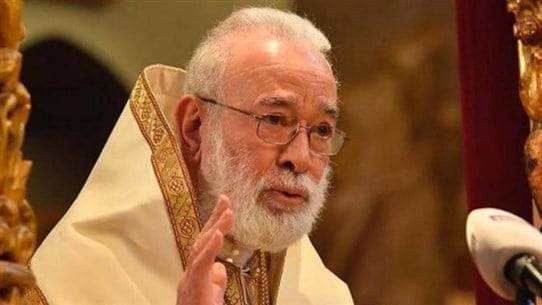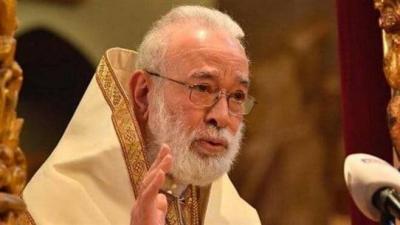Metropolitan Elias Aoude presided over the Divine Liturgy at St. George’s Cathedral. After the Gospel, he delivered a sermon in which he said: "We see in the man possessed by demons for a long time, and in the people of the Gerasenes, two different approaches to confronting the person of Christ. The first, after being healed, sat clothed and in his right mind near the Lord, wishing to follow him, while the others, as soon as they saw the healed man and learned what had happened, were afraid and asked Christ to depart from their region. This marvelous event shows the power of Christ and His love for His miserable creation, and the different reactions it evoked. The difference in reactions reveals to us some basic truths: it shows us how, in his fall, man became the most amazing and contradictory of God’s creatures, and it indicates that every human being is unique, incomparable, and free in his choices." He added: "Clinging to or denying Christ are two options available to us due to the freedom granted to us. If we want to be more precise, we would say that our freedom lies in these two choices. Christ encompasses all creation; therefore, our decisive and critical choices are tied to His person. Rejecting Christ, regardless of the reasons, is one of the negative aspects of our freedom. Those who choose this stance are the indifferent who live outside His body, that is, the Church, due to their ingratitude. Their path leads to disaster, but Christ does not want to change their choice by His authority because He respects their freedom and does not impose it, just as we cannot impose His freedom. Freedom of choice is not a sign of perfection but rather evidence of imperfection. According to our holy fathers, the free human is one who has united his will with the will of God. This has become a dwelling place for God, and then, by virtue of a life of grace, transcends the limits of birth and death, which obstruct human freedom. Hesitation before making a choice indicates that we have not yet gained clear knowledge of good. Of course, in the absence of freedom of choice, we do not achieve the perfection of freedom. With the freedom motivated and measured by love, we choose the will of God and unite with Him. Freedom without love is a disaster. We love Christ and hear His word, and if we do not truly love Him, we cannot follow Him. If we understand His commandments merely as threats to our bodily comfort and do not see them as a gift of grace and liberation from the authority of sin, we distance ourselves from His person and His word. We ask, like the people of the Gerasenes, for Him to depart from us because a great fear has seized us in the face of His word, which is sharper than any two-edged sword."
He continued: "The judgment of the world lies in its choices. We choose our destiny in eternal life, either to participate in the light or to reject it, through our way of life and our intellectual convictions. The Lord says in the Gospel of John that the reason for the condemnation of the ungrateful is that the light, which is Christ, came into the world, but people loved darkness more than the light because their works were evil (3:19). This ingratitude is seen in the choice of the people of the Gerasenes. There is no other reason for this choice except that their deeds were evil. They were tending to pigs, and thus, they transgressed the law that prohibited eating pork. The shepherds, leaders of the rebellion, informed the area’s inhabitants of the miracle. The terrifying man, who was possessed by demons, became like an innocent lamb, while the group of demons entered into the herd of pigs and drowned in the waters. The locals did not rejoice over the healing of their fellow, but were seized by a great fear resulting from their transgression of the law. This terror left no room for joy in being freed from fear, because their disobedience had disrupted the scales of their souls; they feared the peace of Christ more than they feared the madman. The peace of the Lord came into their region, removing the obstacles of fear and its causes, but they loved the cause of evil so much that they could not bear His rebuke."
He said: "Faith is a gift from God, but it is also a virtue that God plants in us, and in order to bear fruit, it requires a response from our freedom. Faith is not imposed; it liberates and heals, releasing from the bondage of sin and the material world. God planted faith in the possessed man to free him from the authority of the demons. His healing was a call from God that found a response in his complete readiness. He sat at the feet of the Lord asking Him to follow. He was bound by the chains of the devil, but now he is bound by the love of the One who healed him—Christ, who saved him but did not enslave him. Instead, He asked him to return to his house. He did not exploit his gratitude nor his eagerness to add another disciple to His followers, as earthly leaders would do. He sent him to his house because in this there is salvation for himself, his relatives, and his compatriots. He instructed him to tell what God had done for him, making him an ambassador preaching His love. This commandment is obeyed by the saints of the church when they speak to the people. They do not talk about their concepts and private philosophies, but rather tell how God heals man and liberates him from the authority of sin, and how He makes him capable of uniting with Him, that he may become a brother of Christ and a co-heir, that is, truly free."
He added: "Just as man rises up against sin and its instigator, thus freeing himself, so too did the Lebanese rise up to liberate their country, through their people’s revolution, from those who enslave the citizens and chain them with the shackles of crises, humiliation, injustice, and subservience. Years have passed since a revolution that has become a memory, as the citizen occupied himself with health, food, and economic security, forgetting to demand freedom and to revolt against the enslaved. The political struggle, the competition to seize opportunities for achieving interests, and the fruitless debates have led us to this decay in institutions and morals. The talk of the possibility of reaching a vacancy in the presidential seat has become an accepted matter. This situation, if it means anything, indicates the shortcomings of the parliamentary council, the dryness of political practice and its regression, and the erasure of the bright image of democratic Lebanon as it was in the past. What prevents the regularity of democratic life, the supremacy of the constitution on political life, and the rotation of power at the set times, without tremors or delays or disruptions? How do we put an end to the short-sightedness of the political class and its focus on its interests and political future, instead of thinking about the future of the country and its children? Do they realize that the months or years lost before electing a president or forming a government are ages dragging this nation, which was democratic, advanced, and developed, backward?"
He continued: "It is regrettable to acquiesce to vacuity and to the threat of something beyond constitutional and social chaos, as if this chaos will affect one group and not another, or harm the interests of one group and not another. Is not chaos a disaster for the entire country and all citizens? And what do we gain from chaos except more poverty, hunger, misery, despair, and destruction? Therefore, the representatives have a significant responsibility; if they refrain from fulfilling it, they are like those who slaughter their nation. If they are aware of the seriousness of the situation, let them close themselves in the council hall and not leave it until they elect a president."
Bishop Aoude concluded: "Our hope is that everyone realizes the gravity of the situation and gives all efforts to elect a president without procrastination or disruption. Our call today is to be liberated from all kinds of demons that may strive to enslave us, and to take the initiative to sit at the feet of the Lord, hear His word, and hasten to proclaim what He has done for us of His great works."




